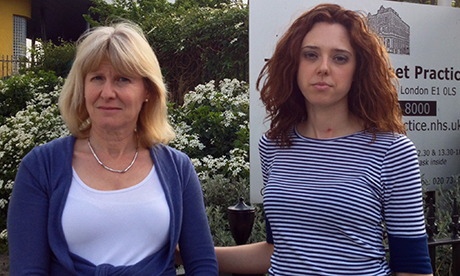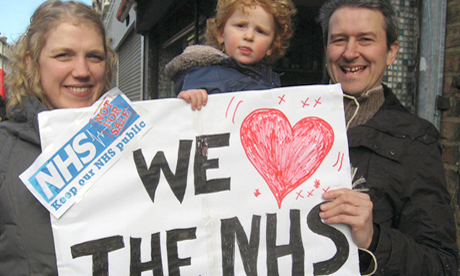12 Hackney GP surgeries threatened with closure because of government cuts

GP Naomi Beer and practice manager Virginia Patania at the Jubilee Street Practice, which is coordinating efforts in East London to halt the proposed cuts
GPs are warning that hundreds of thousands of patients in East London face being left without a doctor because of funding cuts.
12 GP practices in Hackney face the threat of closure because of plans to scrap a funding set-up that healthcare professionals say means over-stretched practices in deprived areas stay financially secure.
Care costs tend to be high in areas with high poverty rates because of links between poverty and ill health – but since 2004 the Maximum Practice Income Guarantee (MPIG) has compensated such practices for this greater expense.
But MPIG could now be phased out under the plans being spearheaded by Health Secretary Jeremy Hunt which would involve redistributing so-called core funding.
NHS England says this would bring practices onto a more equal footing financially, but perversely the changes mean those practices in rich areas stand to benefit while those in areas where poverty rates are high – like Hackney and Tower Hamlets – risk losing out.

Keep our NHS public supporters in Hackney: campaigners fear closure of GP practices could open the door to more privatisation
Uncertainty
Doctors are furious that they were only told in April about these changes, and MPs have tabled no less than 10 Parliamentary questions on the subject to be heard next Wednesday.
Professionals in the City and Hackney healthcare zone are now busy working with their counterparts in Tower Hamlets to “kick up the most almighty stink,” said Virginia Patania, Practice Manager at the Jubilee Street GP Practice in Tower Hamlets – the practice now coordinating the fight in East London to halt the phasing out of MPIG.
Ms Patania spoke last night at a Hackney Coalition to Save the NHS meeting at Abney Hall in Stoke Newington, which was attended by over 100 patients and residents. GP Dr Gary Marlowe also spoke out against the proposed changes.
Today Ms Patania told the Hackney Citizen: “This government introduced a formula that said that the fact that in a particular area no one speaks English and that poverty is massive makes no difference.
“For us the loss of MPIG means the loss of jobs for our 60 staff, but really the issue is what will happen to those thousands of patients.”
She said 200,000 of London’s most deprived patients would be left without a doctor because of the cuts and suggested the bankrupting of practices could allow the private sector to move in and fill the void, potentially causing disruption and uncertainty.
She added: “East London produces among the best clinical outcomes in the country. The thought of having someone come in and destroy all the hard work of the Clinical Commissioning Groups is galling.”
The Department of Health declined to comment.
‘Bedrock of the NHS’
An NHS England spokesperson said: “The changes are part of a national policy to bring all practices into an equal financial position and to ensure that all patients can expect the same high level of service from their GP where ever they live. These changes will take place over seven years to allow practices time to adjust and plan for them.
“As a result of these changes, the majority of GP practices in London will receive more funding in their global sum, however, a small number of practices will lose funding.
“We have we set up a working group with the Office of London CCGs and Local Medical Committees from across the capital to support those GPs affected and consider what arrangements might be put in place to help them with the changes they will need to make.
“We have also offered to meet with the most affected practices – including the Jubilee Street Practice – to discuss their unique challenges and ways these may be overcome.
“GPs are the bedrock of the NHS and are central to our plans to improve healthcare in London. We are working closely with GPs from across the capital on how to meet the challenges of a growing and changing London and reform services so they work better for both doctors and patients.”
Open letter
In an open letter to Jeremy Hunt, Ms Patania and GP Dr Naomi Beer wrote: “Tower Hamlets has the third highest deprivation score in the country, as well as the highest number of children living in poverty. We are one also of the most multi-cultural boroughs in England, with over 35 per cent of the population being of Bangladeshi or Somalian descent. There are a number of needs created by our diverse profile which will not be seen elsewhere in the country. Some of our practices, for example, have fewer than half of their patients who speak English.
“Tower Hamlets has some of the country’s highest health challenges, including the lowest life expectancy for women in the country, highest premature death rate from cancer, and the third highest level of childhood obesity in the country.
“These service needs were previously met to a considerable extent by the Minimum Practice Income Guarantee, not least because it funded the extra staffing required to mitigate the multiple complex needs of residents.
“The removal of deprivation based financial compensation is one of the factors forcing some surgeries to consider closure.”
The letter, sent early this month, describes the situation as an “urgent funding crisis” and requests a meeting with the Secretary of State “as soon as possible”.
Ms Patania said Jeremy Hunt has yet to reply to her.
